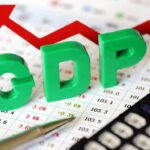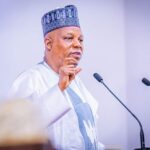The use of air and rail transportation has increased due to the high rate of insecurity in the country.
According to the Statistician-General of the Federation and CEO of the National Bureau of Statistics (NBS), Semiu Adeyemi Adediran, rail transport & pipelines and air transport saw a growth of 124.54 per cent and 50.68 per cent respectively, making them the fastest-growing activities in real terms during the first quarter of 2022.
This is just as Nigeria’s Gross Domestic Production (GDP) sustained a six-month positive growth to record a 3.11 per cent in the first quarter of 2022.
The figure is a slight drop from the 3.98 per cent recorded in Q4 2021.
Speaking at a press conference Monday, the NBS chief said the Nigerian economy has maintained a positive trend for the sixth consecutive quarter after the economic shock by the COVID-19 pandemic.
“In terms of real GDP, the first quarter of 2022 was recorded at N17.35trn, higher by N522.49bn than the N16.83 trillion recorded in the first quarter of 2021.”
On the broader sectoral performance, Adeniran stated that agriculture grew by 3.16 per cent in real terms, higher than the 2.28 recorded in the same period last year.
But the industry grew in a negative trend of -6.81 per cent, which is a decline from the 0.94 per cent in the previous year. While the services sector grew by 7.45%, an improvement from -0.39% reported in the first quarter of 2021.
He added that the oil sector, which is the mainstay of the economy, production reduced to 1.49 million barrels per day (mbpd), lower than the daily average production of 1.72mbpd recorded in the same quarter of 2021 by 0.23mbpd and lower than the fourth quarter of 2021 production volume of 1.50mbpd by 0.01mbpd.
On the other hand, the non-oil sector grew by 6.08% in real terms, which is higher than the 5.28% recorded in 2021.
Senior Research Analyst at FXTM, Lukman Otunuga, said there are two ways one could interpret Nigeria’s latest GDP figure of 3.11% in Q1 of 2022. “The optimists will say the country’s economy grew for the sixth consecutive quarter in Q1 while pessimists may highlight how economic growth slowed for the third consecutive quarter.
“Either way, Nigeria’s economy continues to display resilience against external and domestic risks. With the improvement in the non-oil sector driving growth, this may brighten the growth outlook.”
He also noted that while this could be signs of Nigeria breaking away from the chains of oil reliance to derive growth from sustainable sources, it may be too early to come to any meaningful conclusion. “However, the report is encouraging and illustrates progress made by the country in reclaiming stability post-Covid-19.”
Meanwhile, ahead of the Monetary Policy Committee briefing later today, the expert has predicted a hold position on the current parameters.
The MPR was kept at 11.50%, with an asymmetric corridor of +100/-700 basis points around the benchmark interest rate; CRR was retained at 27.5%; and the Liquidity Ratio was left at 30%
Otunuga said with economic conditions somewhat improving, the Central Bank of Nigeria (CBN) is unlikely to raise interest rates this week. “Given how Africa’s largest economy has been able to maintain growth in the past six quarters on the back of loose monetary policies by the CBN, a rate hike could disrupt Nigeria’s economic recovery.”
As the global war against inflation rages on, central banks are stepping up.
According to Otunuga, the CBN is likely to remain on the sidelines for now. Nevertheless, inflation is still a cause for concern with consumer prices accelerating for the third straight month to 16.82% in April 2022.
He said with the general elections around the corner, pre-election spending could translate to rising price pressures. “On top of this, the widening policy divergence between the Federal Reserve and the CBN could punish the Naira. It’s worth keeping in mind that the dollar remains heavily supported by aggressive Fed rate hike bets and is likely to remain strong for the rest of 2022. A powerful dollar is bad news for emerging market currencies including the naira which continues to depreciate in both the official and unofficial markets.”
By Sunday Michael Ogwu & Faruk Shuaibu

 Join Daily Trust WhatsApp Community For Quick Access To News and Happenings Around You.
Join Daily Trust WhatsApp Community For Quick Access To News and Happenings Around You.


